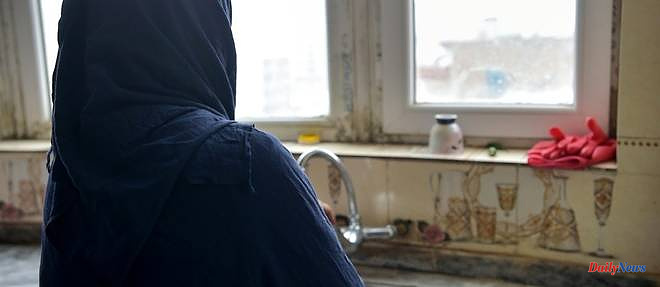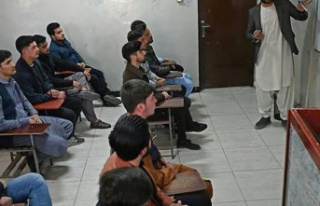Terrified of being found by her violent ex-husband who knocked out all her teeth, Marwa has been living in hiding in Afghanistan since the return to power of the Taliban who annulled her divorce like that of many other women.
Marwa (her first name has been changed), 40 years old and mother of eight children, obtained a divorce six months before the takeover of power in August 2021 by the Taliban, who have since increased draconian measures against women.
This Afghan is one of a small but growing number of women who, under the previous US-backed government, were granted legal separation in this patriarchal and deeply conservative country.
But for Marwa, the relief of finally being separated after 20 years of marriage was short-lived.
As soon as they are in power, the Taliban go to her home accompanied by her ex-husband who assures them that he was forced to divorce. They ask him for the court decision, tearing it up, retorting that it is no longer valid, and forcing him to return to live with his executioner.
“My daughters and I cried a lot that day. I thought to myself: Oh my God, the devil has come back,” Marwa told AFP, holding a rosary.
Summoned to resume her married life, the mother of the family sees the blows redouble. In the summer of 2022, she resolves to flee with her children, escaping the vigilance of her ex-husband who has gone to a family ceremony.
Today, "my children sometimes say to me: Mother, it does not matter if we are starving, at least we are rid of the abuse. Before we suffered both", reports the Afghan, in her new home almost completely empty.
"He abused me all the time, was rude. He always found excuses to beat me. He didn't allow me to go see my mother or anyone else, he locked me in the house."
Her husband's anger was also directed against Marwa because she had not given birth to enough boys, specifies the forties, mother of six daughters and two sons, showing the scars of the beatings.
"(My) hands were broken seven to eight times (...). There were days when I fell unconscious and my daughters fed me".
"He used to pull my hair until I was partly bald. He beat me so much that all my teeth were knocked out," Marwa continues.
Marwa's case is far from the only one, as confirmed by a lawyer, Nazifa, who has received at least "five calls" in recent months from divorced clients asking for her help.
The young lawyer, who has handled more than a hundred divorces and does not wish to give her last name, also assures us that colleagues have told her that they have received the same kind of requests recently.
In Afghanistan, nine out of ten women are victims of physical, sexual or psychological violence from their partner, according to the United Nations mission in the country.
“Previously, according to the custom in Afghanistan, it was thought that a woman had to accept any situation and had no way of separating from her husband,” explains Nazifa.
“Then with word of mouth, women learned that there was a solution and divorces increased,” she adds.
The lawyer, now banned from working by the Taliban, points out: "According to Islam, as a last resort when there is no longer harmony between husband and wife, divorce is authorized".
Yet for 18 months, the new Afghan leaders with their austere interpretation of Islam have called into question the divorces pronounced previously, plunging women like Marwa into situations all the more desperate as almost all the organizations likely to help them have gone.
Terrified, she did not even tell her mother where she was to prevent her from being pressured by her ex-husband.
"Nobody knows us, not even our neighbours," she explains, while her daughters work on antique sewing machines to make clothes that they will then sell.
On the side of the Taliban authorities, it is assured: "If we receive such complaints (from women forced to return with their ex-husbands), we will examine them in accordance with Sharia," the spokesman told AFP. of the Supreme Court, Inayatullah.
As to whether the Taliban regime recognizes divorces pronounced under previous governments, the spokesperson evokes "a very important and complex question", which was submitted "to Dar al-Ifta (a body responsible for interpreting Islamic law) who examines it".
Sana's fate is not very different from Marwa's. This 37-year-old woman, whose first name has been changed, is hiding with her seven children in a house, where AFP spoke to her, in order to escape the clutches of a violent ex-husband.
Locked away in a cold room with bare walls where she spends most of her time, the family lives in fear of being discovered.
"Every time there's a knock on the door, I'm afraid he's found me and taken the kids away," says Sana, whose only sons are allowed out to collect plastic from the streets.
Two months after the Taliban took power, the 30-year-old, who had decided to divorce a year earlier, saw her ex-husband, of whom she had no further news, arrive at her home accompanied by members of the armed forces. of security.
This cousin, whom she married at the age of 15 when he was ten years old, is contesting the divorce and demanding to recover all their children.
To protect them, Sana, who used to be beaten because their "baby was crying or the meal wasn't good enough", resigns herself to returning to her old life.
She learns that her husband has a second wife, but agrees to become this man's "servant". Until he decides to forcibly engage their two eldest daughters to the Taliban.
"My daughters often said to me: Mom, we are going to kill ourselves," says Sana in tears, who will finally flee with her children, after pretending to go shopping.
Without this decision, "my daughters' lives would have been destroyed and would have become worse than mine", sobs Sana, while her eldest, regularly suffering from anxiety attacks, rocks her body mechanically back and forth, the haggard look.
The scenes of violence also deeply marked Marwa's daughters and their relationship with men: "I'm afraid I won't be able to marry them off," confides the forty-year-old. “They say to me: Mom, we hate the word husband seeing how your life has been so bad”.
06/03/2023 08:15:17 - Kabul (AFP) © 2023 AFP












